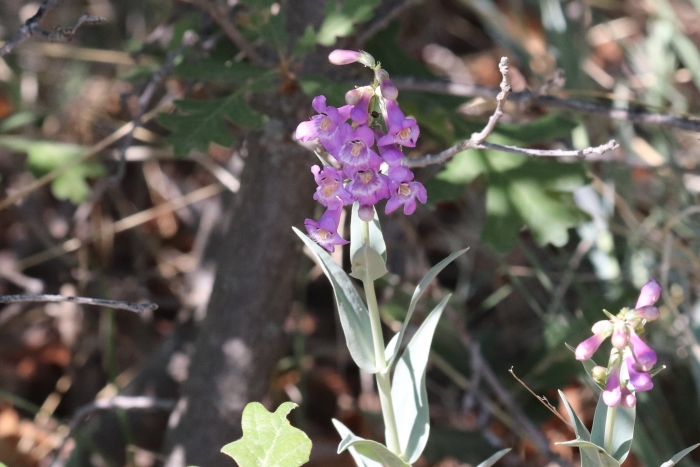Sidebells Penstemon
(Penstemon secundiflorus)
Sidebells Penstemon (Penstemon secundiflorus)
/
/

Shane Sherwood
CC BY 4.0
Image By:
Shane Sherwood
Recorded By:
Copyright:
CC BY 4.0
Copyright Notice:
Photo by: Shane Sherwood | License Type: CC BY 4.0 | License URL: http://creativecommons.org/licenses/by/4.0/ | Rights Holder: Shane Sherwood | Publisher: iNaturalist | Date Created: 2018-05-29T22:02:16-07:00 |





















































Estimated Native Range
Summary
Penstemon secundiflorus, commonly known as Sidebells Penstemon, is an evergreen perennial herb native to rocky slopes, open woodlands, and desert scrub in the Southwestern United States and Northwest Mexico. It typically grows to a height of 1-2 feet (0.3-0.6 meters) and a width of 0.5-2 feet (0.2-0.6 meters). The plant has a clumping form with narrow, lance-shaped leaves and erect stems. The tubular flowers, which bloom in the late spring to early summer, are a striking combination of pink and purple and are particularly attractive to hummingbirds and pollinators.
Sidebells Penstemon is valued for its drought tolerance and showy flowers, making it an excellent choice for xeriscaping and rock gardens. It is also used in border plantings and as a ground cover in areas with dry, well-drained soils. While it thrives in full sun, it can also tolerate partial shade. This species is relatively low-maintenance, requiring minimal water once established. It is not known for serious pest or disease issues, but overwatering can lead to root rot. There are no widely known popular garden cultivars of this species, but its natural form is well-suited to naturalistic plantings.CC BY-SA 4.0
Sidebells Penstemon is valued for its drought tolerance and showy flowers, making it an excellent choice for xeriscaping and rock gardens. It is also used in border plantings and as a ground cover in areas with dry, well-drained soils. While it thrives in full sun, it can also tolerate partial shade. This species is relatively low-maintenance, requiring minimal water once established. It is not known for serious pest or disease issues, but overwatering can lead to root rot. There are no widely known popular garden cultivars of this species, but its natural form is well-suited to naturalistic plantings.CC BY-SA 4.0
Plant Description
- Plant Type: Herb
- Height: 1-1.5 feet
- Width: 0.5-1.5 feet
- Growth Rate: Moderate
- Flower Color: Purple
- Flowering Season: Spring
- Leaf Retention: Evergreen
Growth Requirements
- Sun: Full Sun
- Water: Low
- Drainage: Medium, Fast
Common Uses
Bee Garden, Bird Garden, Butterfly Garden, Deer Resistant, Drought Tolerant, Fire Resistant, Hummingbird Garden, Low Maintenance, Rabbit Resistant, Rock Garden, Showy Flowers, Street Planting
Natural Habitat
Native to rocky slopes, open woodlands, and desert scrub in the Southwestern United States and Northwest Mexico
Other Names
Common Names:
Scientific Names: , Penstemon secundiflorus, Penstemon secundiflorus subsp. lavendulus, Penstemon secundiflorus var. caudatus,
GBIF Accepted Name: Penstemon secundiflorus Benth.